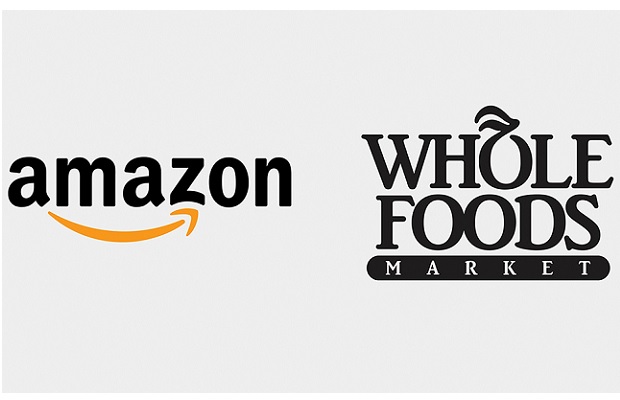Amazon is buying Whole Foods in a deal valued at $13.7bn (£10.7bn), shaking up the grocery sector.
The transaction will see the online retail giant take over a business with 460 stores in the US, Canada and the UK which enjoyed sales of $16bn (£12.5bn) in the 2016 financial year.
The deal caused shares in supermarket chains to slide lower, with Tesco down 5% and Sainsbury’s dipping 4% in the UK while America’s Walmart – owner of Asda – fell 5% and France’s Carrefour was down 3%.
Texas-based Whole Foods, which has nine UK stores mainly in London, will continue to operate under its own brand. It specialises in healthy and organic ranges.
The deal will be seen as a further encroachment by Amazon on the UK grocery sector’s turf after its delivery service Amazon Fresh, covering postcodes across London, Surrey and parts of Hampshire, was launched last year in a tie-up with Morrisons.
Amazon boss Jeff Bezos said: “Whole Foods Market has been satisfying, delighting and nourishing customers for nearly four decades – they’re doing an amazing job and I want that to continue.”
Whole Foods, founded in 1978, describes itself as “America’s healthiest grocery store”.
Co-founder and chief executive John Mackey said: “This partnership presents an opportunity to maximise value for Whole Foods Market’s shareholders, while at the same time extending our mission and bringing the highest quality, experience, convenience and innovation to our customers.”
Whole Foods has recently come under pressure from an activist investor prompting it to overhaul its board.
The deal is subject to regulatory and shareholder approval and is expected to complete in the second half of 2017.
Amazon, which started life as an online book store in the 1990s, has already been making tentative moves into bricks-and-mortar bookshop and food sites in the US.
75% “would prioritise shopping at an Amazon high street store”
Commenting on the deal, Rupal Karia, Head of Commercial, UK and Ireland at Fujitsu cited research that 75% of people believe Amazon will become their go-to store if they have a physical presence.
“This move by Amazon to buy Wholefoods is just the latest in its ongoing diversification and strengthening of its plethora of services,” Karia said. “Amazon already has its Amazon Fresh arm, and this acquisition will only strengthen its arsenal and solidify its place in the grocery sector. Although Amazon is predominantly an online first retailer, this deal is clearly testament to the fact that shoppers still want a physical experience with retailers, and this caters perfectly to that. It is also a shrewd move from Amazon to acquire a well-respected grocer with a strong physical presence and loyalty base already, as it means they will already have a strong customer following, but it’ll be interesting to see how they move the brand forward into the digital age.
“As consumers want to be able to shop with flexibility – sometimes online, sometimes in-store – and expect the experience to be seamless regardless of the channel they choose, this new deal caters to that need, marrying Amazon’s online expertise with Wholefood’s physical presence. This is where retailers need to find ways to match it and ensure they are differentiating themselves from their competitors. Our recent study highlighted that that 8-in-10 consumers would spend more with retailers that have a better technology offering, which means that whilst high street stores hold greater opportunities than ever, those unwilling to embrace technological advancements will not reap the rewards. Retailers need to take note and ensure that they too are providing their customers with the relevant channels for their shopping needs and not run the risk of freezing out customers for failing to do so.”
